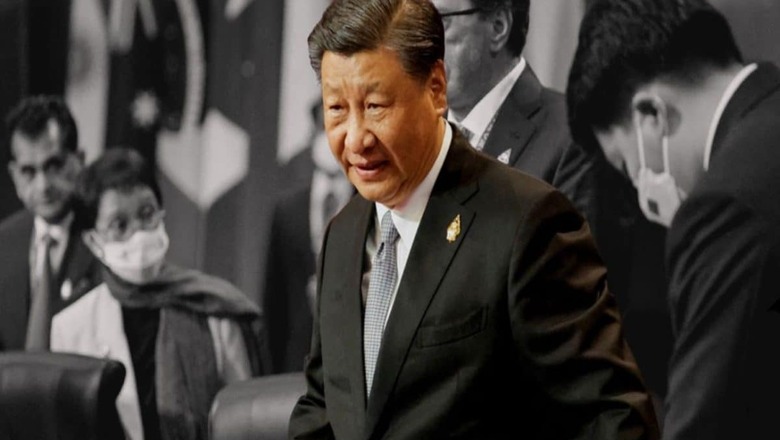
views
As it turns out, China does not like to hear or see the phrase ‘Vasudhaiva Kutumbakam’. Often used by Prime Minister Narendra Modi in his diplomatic addresses, the phrase has found its place at the top of the G20 agenda under India’s presidency. Chinese President Xi Jinping is not too pleased by this and judging by the discomfiture and pettiness of the Chinese in various G20 meetings, Xi may be setting the stage for skipping the final summit of G20 leaders in September this year.
Is China looking to subvert India’s G20 presidency as the host nation strives to achieve an impactful joint communique, a Leaders’ Declaration, at the end of it despite a torn geopolitical landscape? It would not be a surprise that it may do so. Earlier, China boycotted the G20 meetings hosted by India in Kashmir and Arunachal Pradesh. Now, it is reportedly opposed to welcoming or endorsing ‘Vasudhaiva Kutumbakam’ as a concept.
According to an Economic Times report, China opposed the inclusion of the phrase in almost every G20 meeting so far under India’s presidency. The Sanskrit phrase from the Maha Upanishad is the Indian presidency’s G20 theme and essentially conveys that the world is one family.
ET reports that most of the participant nations weighed in favour of India on the matter with some even observing that the theme was the prerogative of the presidency and host nation. But China has fought against this Sanskrit phrase tooth and nail. China argues that the G20 documents could not use the term ‘Vasudhaiva Kutumbakam’ in the official text as it is in Sanskrit, which is not one of the six official languages recognised by the United Nations. The six languages are Arabic, Chinese, English, French, Russian and Spanish. Obviously, this does not depict the global realities of today and only highlights the need for reforms in the UN. How wise did China expect to come off by writing off Sanskrit, the ancestor of most Indian languages?
This is an incredibly petty grouse raised by the Chinese. While no other nation has a problem with this phrase, why is China so unsettled by it? After all, it only translates to “The World is One Family”— a powerful and unifying message. What, then, irks China so much that it has opposed this in every meeting?
A 21st-Century Clash of Two Ancient Civilisations
The answer lies in China’s deep-seated insecurities given India’s rising stature on the global stage, and the growth trajectory it is poised for. Perhaps, China sees this dynamic as a clash of two great ancient civilisations rising to the top once again, and it is afraid that India, still rooted in its culture, commands far more soft power in this space than the deracinated Chinese Communists can dream of. India’s ‘Vasudhaiva Kutumbakam’ message resonates with all and inspires nations to look up to India’s great civilisational wisdom. There is no doubt that wisdom emanating from India’s ancient civilisation gives the nation tremendous soft power, one that China may envy, as it pushes its own civilisational history to claim the position of the ultimate world leader but finds fewer takers.
An Unsure Xi
At a time when Prime Minister Modi, while taking a tough stand against China for its refusal to settle the ongoing border issue, is being embraced globally, and frankly on both sides of the aisle — factoring in his manoeuvres between Russia and the West, Xi is an unelected dictator who remains caught up in his adversarial image and is busy buying good press to redeem his public perception. That can make any man insecure, and Xi may not be above it.
Unease over a challenging future
China’s discomfort may also have something to do with the harsh reality it has to deal with. At a time when reports of China’s demographic decline have officially begun, India surpassed its population and is projected to continue growing until 2064. A shrinking and ageing population worries China deeply as it may jeopardise its superpower status going forward.
As per an analysis done by the United Nations’ World Population Prospects-2022, India’s population is expected to grow up to 166.8 crore while China’s population would shrink to 131.7 crore, by 2050. India’s median age is 28, 11 years younger than China’s 39. Further, according to Goldman Sachs, India has the window to “get it right in terms of setting up manufacturing capacity, continuing to grow services, continuing the growth of infrastructure.”
India’s dependency ratio is going to be among the lowest among large economies for at least 20 years. That means there will be a lesser burden of the non-working population on India’s working population. This is not the case with China, whose demographic landscape is skewered by the generational impact of its infamous One Child Policy.
At the same time, India is projected to become the second-largest economy by 2075, after China, closing the GDP gap to $5 trillion. All signs show that India’s moment in the 21st century may have finally arrived and China’s insecurities are loud and clear.
China’s opposition to ‘Vasudhaiva Kutumbakam’ appears rooted in a mix of insecurity, global power dynamics, and questionable arguments, shedding light on its complex motivations and concerns with regard to India’s G20 presidency. It is expected that China may try more such tricks to subvert India’s plans as it prepares to host G20 leaders this September.


















Comments
0 comment